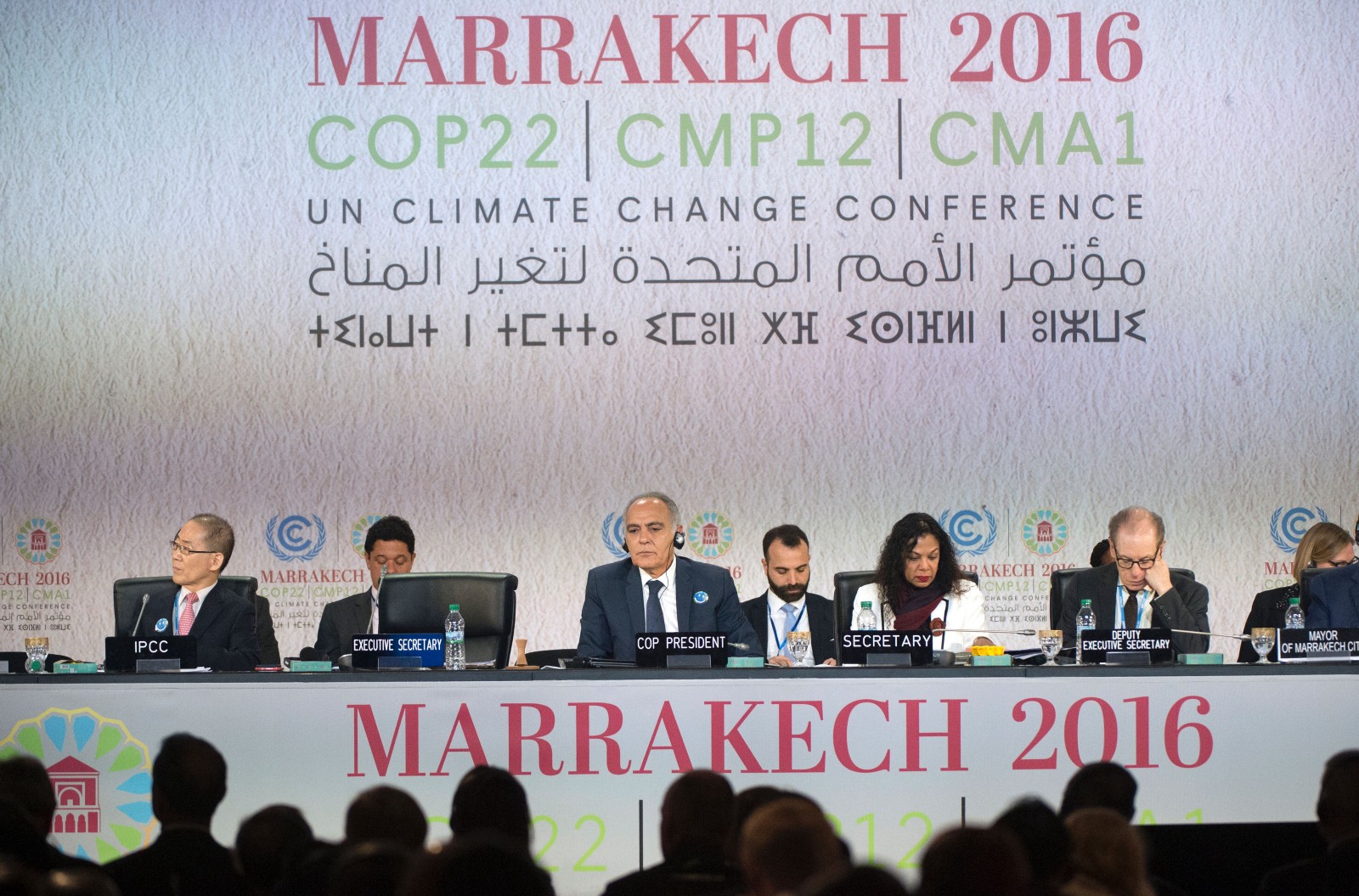Regardless what happens in today’s U.S. election, leaders at COP22 in Marrakech stress that the world is moving forward—but, in private, a lot of people here express concern.
By Eric J. Lyman

Some very powerful people, sitting in Marrakech, possibly thinking about Donald Trump. (Photo: Fadel Senna/AFP/Getty Images)
It isn’t news that much of the world is eagerly awaiting results of Tuesday’s presidential election in the United States. But in one corner of Morocco—Marrakech, the Red City, serving as home to the latest round of United Nations climate negotiations—the wait is particularly poignant.
The 22nd Conference of the Parties, best known as COP22, got underway Monday, and, in almost every COP22 press conference before or after the opening, there was a question or two about what might happen if Donald Trump — the Republican nominee who calls climate change a “hoax” and says he would “cancel” last year’s Paris Agreement if elected— prevails over rival Hillary Clinton, a strong supporter of climate action.
A round of nervous giggles often accompanies the Trump questions in Marrakech, but it’s clear that visiting delegates and observers will laugh much easier if Trump is defeated.
At last year’s summit in the French capital, delegates from nearly 200 countries finalized the Paris Agreement, the world’s first global climate pact. This year, countries are starting work on the “rulebook” for implementation of the Paris deal. Uncertainty coming from U.S. election is, as one climate activist calls it, an “unwelcome distraction.”
Go back 16 years and there is a kind of uneasy precedent to the current situation. That year, delegates gathered at COP6 in the Hague to start work on the “rulebook” for the 1997 Kyoto Protocol. Those talks started a week after the U.S. elections, but, because of the famously contested results in Florida, it took more than a month before it was clear who would be the next president.
At the time, some delegations in the Hague wanted to craft a deal that the lame-duck Bill Clinton administration could accept; others wanted to hold out for stronger terms that would land on the desk of the next U.S. president. The talks went into overtime but remained stalemated. Negotiations were “suspended” rather than “closed,” and they reconvened eight months later in Bonn, Germany — four months after newly installed President George W. Bush announced that the U.S. would reject the Kyoto treaty.
The Kyoto Protocol included obligations to reduce emissions for three-dozen industrialized countries, but with the U.S. — the world’s largest polluter at that time — on the sidelines, it never had the far-reaching impact its architects intended.
In Marrakech, the conference’s leadership insists that history will not be repeated with the Paris deal, the successor to the Kyoto Protocol, even if Trump wins the election.
“I think we should not over-emphasize the importance of Donald Trump,” says Laurence Tubiana, France’s climate change ambassador, who adds that it would be a “shock” to her if Trump is victorious.
“But even if that happened, even if Donald Trump wins,” she continues, “we would all wake up Wednesday morning and still say ‘We will stick to the Paris Agreement.’”
Other observers say climate-related fears from a possible Trump presidency might be overblown.
“If Trump somehow wins, the main incentive for the U.S. to remain in the process won’t be something we do here, some rule that might get passed,” says Alden Meyer, director of strategy and policy for the U.S.-based Union of Concerned Scientists. “The consequences for any country that might choose to disregard the Paris Agreement will come in the form of pressure from other countries in the areas that matter most to them: trade, energy, whatever the case may be. It would hit them where it hurts.”
In the formal national statements during the opening plenaries, Trump was never mentioned by name, a nod to a tradition for multi-lateral negotiations to stay clear of the internal affairs of individual countries. But speaker after speaker nonetheless addressed Trump indirectly in stressing the need for increased international cooperation to confront climate risks, the incontrovertibility of climate science, and the obligation that large, wealthy countries have to play a leadership role in the process.
But in the corridors and meeting rooms of the Bab Ighli facility hosting the COP22 talks, there is no prohibition against discussing the New York businessman in more direct terms.
“We have been delicately constructing a mechanism that will help us confront this global problem, piece by piece, over the course of years,” says one veteran European Union negotiator, who asks not to be named. “On Tuesday, in the U.S., they will vote on whether to elect a man who says he wants to take a hammer, a lead pipe, and a chain saw to that mechanism.”
The delegate concludes: “So, yes, we may be a little nervous.”
By the time the polls close in the U.S., it will be well into the early hours of Wednesday morning local time in Marrakech. But that will not stop dozens of journalists, delegates, activists, and other observers from gathering in Marrakech’s Royal Mirage Deluxe Hotel to anxiously watch the election results roll in.
“We’ll either have something to celebrate, or we’ll all be able to talk each other down from the ledge,” one of the e-mailed invitations to the event reads.





